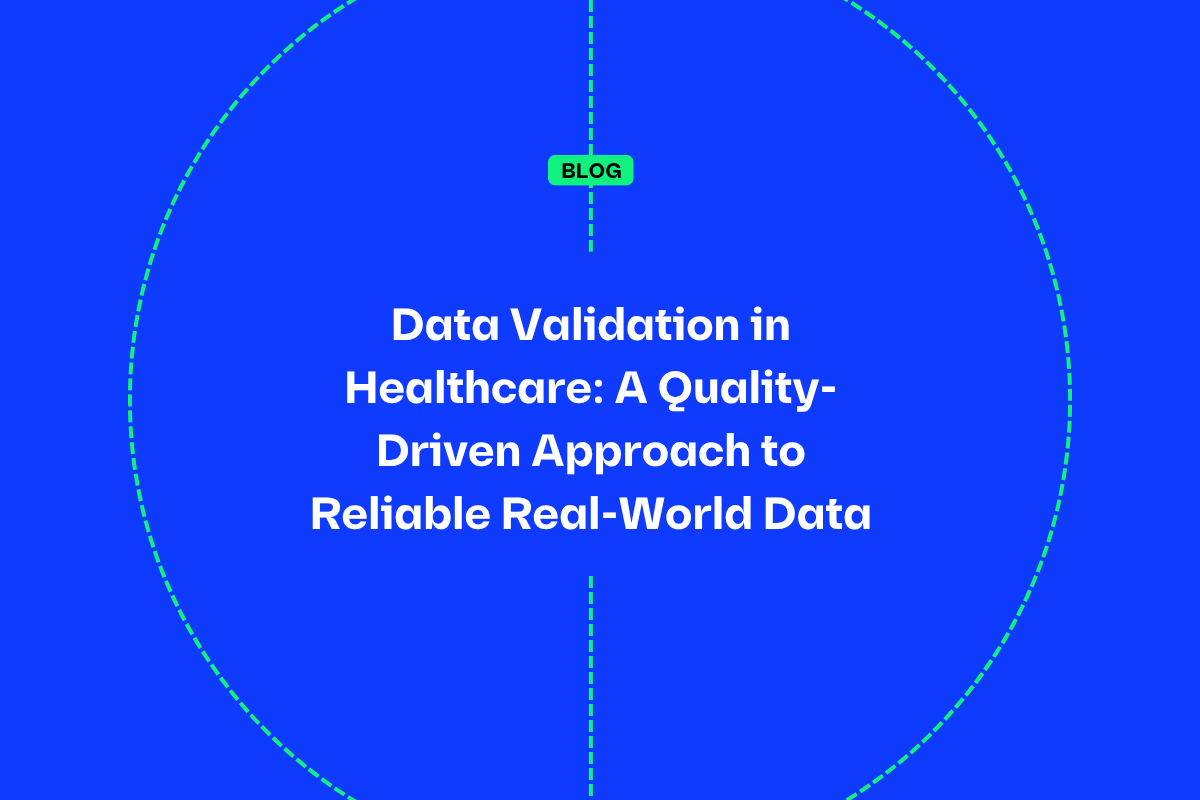About
NEWS
Data Validation in Healthcare: A Quality-Driven Approach to Reliable Real-World Data
CRO
TAG 2
Tag 3

Keep Updated!
Join our newsletter to receive updates and news about the healthcare data sector.
Thank you! Your submission has been received!
Oops! Something went wrong while submitting the form.
The use of real-world data in healthcare is growing rapidly. From advancing clinical research to informing better care decisions, these data offer enormous potential. But their value depends on a fundamental factor: trust.
The use of real-world data in healthcare is growing rapidly. From advancing clinical research to informing better care decisions, these data offer enormous potential. But their value depends on a fundamental factor: trust.
The use of real-world data (health data generated from routine clinical practice) in healthcare is growing rapidly. From advancing clinical research to informing better care decisions, these data offer enormous potential. But their value depends on a fundamental factor: trust. And trust starts with quality.
To ensure this quality, IOMED applies a two-layered approach. The first is verification, where trained reviewers inspect a sample of the extracted data to assess its accuracy. The second is validation, a broader process that assesses entire datasets to confirm they are consistent, complete, and clinically sound. This article focuses on this second layer and why it’s essential for generating reliable real-world data.
Why Data Validation Matters in Clinical Research
Clinical data is inherently messy. It’s created in fast-paced environments, by different professionals, and often captured in free-text notes rich with detail but hard to process automatically.
This variability means that even advanced extraction tools may produce datasets that are incomplete, inconsistent, or clinically misleading. For example, a patient’s record may mention a diagnosis that was later ruled out, or describe a medication that’s no longer in use. If these nuances aren’t correctly interpreted, the resulting data could lead to biased analyses or flawed conclusions.
That’s why validation is a crucial step. It acts as a safeguard, ensuring that the datasets used for research are not just technically correct, but clinically meaningful.
Challenges in Ensuring Data Quality
Working with real-world clinical data means working with all its complexity. Key challenges include:
- Documentation variability: The same condition recorded differently across departments or clinicians.
- Ambiguity in notes: Free text often includes negations ("no signs of infection") or time references ("symptoms started two weeks prior") that automated systems can easily misinterpret.
- Errors in structured data: Even coded fields can contain outdated or contradictory information, like an active medication that was actually discontinued months ago.
These challenges underscore the need for more than just automation. Ensuring data quality requires a thoughtful, layered validation approach that combines technical checks with clinical understanding.
A Multi-Dimensional Validation Approach
At IOMED, data validation is designed to ensure that every dataset is not only technically correct but also clinically meaningful. This process addresses three essential dimensions of data quality:
- Conformance: verifying that the data follows expected formats and coding standards.
- Completeness: checking that required variables and values are present across the dataset.
- Plausibility: ensuring that information makes sense in clinical and temporal terms, for example that a treatment is prescribed only after a diagnosis, or that a patient record does not contain contradictory timelines.
To achieve this, IOMED combines automated and manual validation layers. A dedicated quality check system automatically executes a set of standard checks applied consistently across all data orders. These ensure a reliable baseline of technical quality. On top of this, the Quality Assurance team, working closely with Clinical Specialists, designs and applies clinical checks tailored to each specific dataset and research objective. These ad hoc validations are essential to confirm that the data makes sense in the real-world clinical context.
This dual approach allows IOMED to detect not only obvious inconsistencies but also subtle issues that may arise from the complexity of real-world healthcare data. By iterating between systematic checks and clinical insight, IOMED continuously refine the data, ensuring it can be trusted as a solid foundation for research and decision-making.
Building Trust Through Validation
Data validation is not just a quality check, it’s what makes real-world data actionable. At IOMED, this process ensures that information extracted from clinical practice becomes a trustworthy asset for research and healthcare innovation. By turning complexity into reliability, IOMED helps researchers and providers make decisions they can stand behind, with confidence and impact on patient outcomes.
No items found.




What´s New?
No items found.
Related Posts


